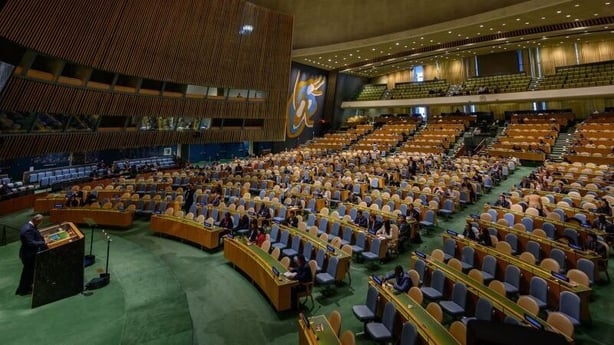For decades, Irish participation in peacekeeping has depended on United Nations approval. Now the Government is proposing to remove the need for United Nations backing before sending peacekeepers abroad, part of the rule known as the "Triple Lock".
Ireland's traditional policy of military neutrality is extremely popular with the public. So is the record of the Defence Forces in peacekeeping around the world.
The Government argues that the proposed change would allow Ireland to participate more effectively in peacekeeping, but the opposition worries that removing the need for UN sanction could threaten neutrality.
So where did the Triple Lock come from?
Since independence, Ireland has been militarily neutral – staying out of World War II, and declining to join military alliances like NATO (although our neutrality has often been more nuanced than people might realise).
However after joining the United Nations in 1955, there was a desire to take part in peacekeeping operations, and legislation was passed in 1960 allowing Irish troops to be sent abroad - but only on missions backed by the United Nations.
At the start of the century, in an effort to meet concerns that the Nice and Lisbon Treaties might undermine neutrality, this rule was restated as the Triple Lock. Under this rule, no more than 12 troops can be deployed on an active mission overseas without: (1) a decision by the Government; (2) the approval of the Dáil; and (3) the authorisation of the United Nations.
Given that Governments usually have a majority in the Dáil, the first two conditions are really part of the one decision; it’s UN approval which is the key proviso.
Supporters of the Triple Lock say it's vital to protect Irish neutrality, and to make sure that Irish troops are deployed only on legitimate peacekeeping operations.

Critics say there is a problem, though - UN peacekeeping missions have to be approved by the Security Council of the United Nations.
And the five permanent members of the Security Council - the United States, Russia, China, Britain and France - each have a veto on Security Council decisions. Which means that any one of them can block UN authorisation for a peacekeeping mission, which in turn would prevent Irish troops from taking part.
This happened with a planned mission to the former Yugoslav Republic of Macedonia in 2003 - Ireland wanted to take part, but because China wouldn't agree to give the mission formal UN approval, the Triple Lock blocked Irish participation.
In fact, the last time the Security Council approved a UN peacekeeping mission was in 2014 - so for nearly a decade, there have been no new UN missions that Ireland has been able to participate in.
Watch: What is Ireland's Triple Lock mechanism
If the requirement for UN approval is removed, Irish troops could be deployed abroad on missions organised by, for instance, the European Union or the African Union, once the Dáil agrees.
This would allow for a quicker response to fast developing situations - like a war or a humanitarian catastrophe - where the UN is slow to act, or prevented from acting by disagreement on the Security Council.
But critics argue that it would raise serious issues for Ireland’s tradition of military neutrality, particularly if, for instance, the mission was NATO-led. The Government disputes this, arguing that neutrality would not be affected, because we still wouldn’t be a member of a military alliance.
The proposed change is already generating plenty of debate - and given the popularity of neutrality, and the different understandings of what it means, that debate is sure to continue as legislation is drafted, and then brought before the Oireachtas.
